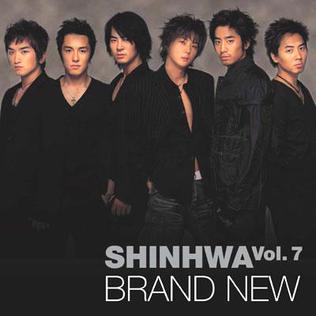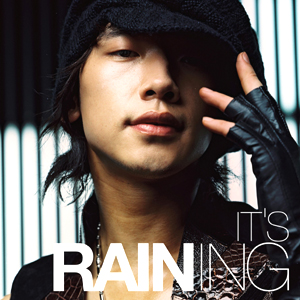
Jung Ji-hoon, better known by his stage name Rain, is a South Korean singer, songwriter, dancer, actor, and record producer. Rain's musical career includes seven albums, 28 singles and numerous concert tours around the world. He achieved breakthrough success with his third Korean album, It's Raining (2004), which spawned the number one single of the same name. The album sold over 200,000 copies in South Korea and one million copies throughout Asia, and established Rain as an international star.

Moon Hee-joon is a South Korean pop rock singer-songwriter signed under SidusHQ. He initially rose to fame as the leader of former boy band H.O.T. under SM Entertainment.

Epik High (Korean: 에픽하이) is a South Korean hip-hop trio formed in 2001, composed of Tablo, Mithra Jin, and DJ Tukutz. Primarily based in Seoul, the group signed with Woollim Entertainment and released their first two studio albums, Map of the Human Soul (2003) and High Society (2004), to minor success. The trio rose to fame with the release of their follow-up studio albums, Swan Songs (2005), Remapping the Human Soul (2007), and Pieces, Part One (2008), spawning the hit singles "Fly", "Paris", "Fan", "Love Love Love", "One" and "Umbrella". Although the majority of these albums were censored by the Ministry of Culture and Tourism due to themes of crimes, war, religion, and education, Epik High established themselves as one of the leading hip-hop artists in the country, gaining a cult following and critical plaudit.

Jaurim is a rock band from Seoul, South Korea. They had performed in the indie scene in 1993. The band's initial name was Full Count. They changed the band's name to Jaurim in 1997 and became major with their first released single 'Hey Hey Hey'. They have released ten full-length albums, three unofficial albums, two original soundtrack singles, one original soundtrack EP, and one concert album. Their ninth full-length album, 'Goodbye, Grief', was released on October 14, 2013. The band is praised for their arrangements, and their singer, Kim Yoon-ah, is often praised for her singing abilities and lyrics.
"It's Coming" is a song by South Korean singer Rain featuring Tablo, taken from his fourth Korean-language studio album Rain's World. It was released on September 21, 2006, and was written and produced by Park Jin-young with additional writing credits by Tablo.

Brand New is the seventh studio album of South Korean boy band Shinhwa. It was released on August 27, 2004, by Good Entertainment. It is their first album since leaving SM Entertainment and signing with Good Entertainment. The four lead singles are "Brand New", "Angel", "Crazy" and "Oh". Brand New sold 324,772 copies in 2004 and was the fifth best-selling album of the year.

The MAMA Awards is a major music awards ceremony presented annually by entertainment company CJ E&M. First held in South Korea, the majority of prizes has been won by K-pop artists, although there are other Asian artists winning in various award categories, such as for Best Asian Artist and other professional-related awards.

The Melon Music Awards is a major music awards show that is held annually by Kakao Entertainment through its online music store Melon. The event was initially a fan-voted award conducted entirely online from 2005 through 2008, and has been officially held offline in Seoul since 2009.

Choi Dong-wook, better known by his stage name Seven, is a South Korean singer. He made his debut in 2003 with the studio album Just Listen, which sold over 210,000 copies by the end of the year and spawned the hit single "Come Back to Me". Its success led Seven to win the Best New Artist awards at various year-end award ceremonies in South Korea, including at the SBS Gayo Daejeon, MBC Gayo Daejejeon, Mnet Music Video Festival and Golden Disc Awards.

Rain 2, alternately titled How to Avoid the Sun or How to Run From the Sun, is the second Korean-language studio album by South Korean pop and R&B singer Rain, released through JYP Entertainment on October 16, 2003. It spawned two singles: the title track "How to Avoid the Sun" and "You Already Knew". A R&B and pop album, Rain 2 was primarily written and produced by JYP founder Park Jin-young, Bang Si-hyuk, along with several other contributors.

It's Raining is the third Korean-language studio album by South Korean pop and R&B singer Rain, released through JYP Entertainment on October 8, 2004. Two singles were promoted for the album with accompanying music videos and promotions on music programs: the title track "It's Raining" and "I Do". The album was released in several territories throughout Asia in 2005, including Japan, Hong Kong and Taiwan.

Rain Effect is the sixth Korean-language studio album by South Korean entertainer Rain. It was released through Cube DC on January 2, 2014, and was distributed by Loen Entertainment. It is his first studio album in 6 years since Rainism (2008) and his first musical release since Back to the Basic (2010). Rain Effect contains a total of ten tracks, including the lead singles "30 Sexy" and "La Song".
The Mnet Asian Music Award for Best Music Video is an award presented annually by CJ E&M (Mnet) at the Mnet Asian Music Awards. The event was launched in 1999 as the Mnet Video Music Awards and was primarily a music video-centered awards ceremony, modeled after the MTV Video Music Awards. From its inaugural ceremony up until the 2005 awards, the category was officially titled Music Video of the Year and consisted of one of the two daesang prizes, alongside the Most Popular Music Video category. In 2006, the event underwent an overhaul; the daesang status of the category was removed, and it was retitled as "Best Music Video". Meanwhile, the Most Popular Music Video category was discontinued.

The 2004 Mnet KM Music Video Festival (MKMF) was the sixth of the annual music awards in Seoul, South Korea, that took place on December 4, 2004, at the Kyung Hee University.
"Come Back Home" is a song by South Korean boy band Seo Taiji and Boys, from their fourth and final self-titled studio album, which was released on October 5, 1995. The group's foray into gangsta rap, the song's lyrical content addresses the societal pressures on young people that push them to run away from home, while the refrain conveys the perspective of the runaways' parents.
"I Know" is the debut single by South Korean boy group Seo Taiji and Boys from their self-titled debut studio album, released on March 23, 1992. It was written and produced entirely by group leader and musician Seo Taiji. Incorporating a mix of Western influences such as hip-hop, new jack swing, and guitars, the song became a pivotal moment in Korean music history and is widely regarded as the pioneering work for the beginning of the modern K-pop market. It was a major commercial hit domestically, breaking the record for the longest charting song at number-one for 17 consecutive weeks.
"10 Minutes" is the debut single by South Korean recording artist Lee Hyori. It is taken from her debut studio album Stylish...E, which was released through DSP Media and CJ E&M on August 13, 2003. A R&B and hip hop number, "10 Minutes" was written by MayBee with production handled by Kim Do-hyun. Following its release, the song became a commercial hit in South Korea and spurred numerous musical and fashion trends at the time—its popularity gave way to what domestic media dubbed as the "Hyori Syndrome".












